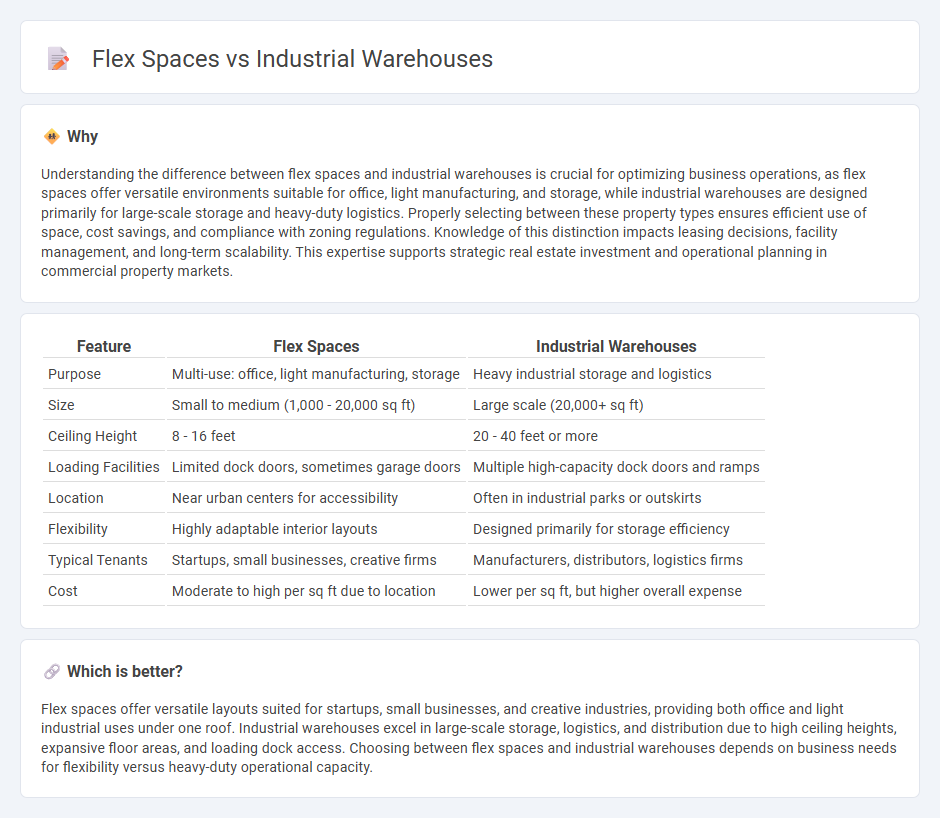
Flex spaces offer versatile real estate solutions combining office, showroom, and light industrial uses in a single property. Industrial warehouses prioritize large storage capacity, optimized for logistics, distribution, and manufacturing operations. Explore the differences in functionality and investment potential between flex spaces and industrial warehouses to determine the best fit for your business needs.
Why it is important
Understanding the difference between flex spaces and industrial warehouses is crucial for optimizing business operations, as flex spaces offer versatile environments suitable for office, light manufacturing, and storage, while industrial warehouses are designed primarily for large-scale storage and heavy-duty logistics. Properly selecting between these property types ensures efficient use of space, cost savings, and compliance with zoning regulations. Knowledge of this distinction impacts leasing decisions, facility management, and long-term scalability. This expertise supports strategic real estate investment and operational planning in commercial property markets.
Comparison Table
| Feature | Flex Spaces | Industrial Warehouses |
|---|---|---|
| Purpose | Multi-use: office, light manufacturing, storage | Heavy industrial storage and logistics |
| Size | Small to medium (1,000 - 20,000 sq ft) | Large scale (20,000+ sq ft) |
| Ceiling Height | 8 - 16 feet | 20 - 40 feet or more |
| Loading Facilities | Limited dock doors, sometimes garage doors | Multiple high-capacity dock doors and ramps |
| Location | Near urban centers for accessibility | Often in industrial parks or outskirts |
| Flexibility | Highly adaptable interior layouts | Designed primarily for storage efficiency |
| Typical Tenants | Startups, small businesses, creative firms | Manufacturers, distributors, logistics firms |
| Cost | Moderate to high per sq ft due to location | Lower per sq ft, but higher overall expense |
Which is better?
Flex spaces offer versatile layouts suited for startups, small businesses, and creative industries, providing both office and light industrial uses under one roof. Industrial warehouses excel in large-scale storage, logistics, and distribution due to high ceiling heights, expansive floor areas, and loading dock access. Choosing between flex spaces and industrial warehouses depends on business needs for flexibility versus heavy-duty operational capacity.
Connection
Flex spaces and industrial warehouses are interconnected through their shared adaptability to accommodate diverse business needs, including manufacturing, storage, and office functions. Both property types optimize operational efficiency with flexible layouts, allowing tenants to quickly modify space usage as demand fluctuates. The growing demand for e-commerce logistics drives increased utilization of these spaces, highlighting their critical role in modern supply chain solutions.
Key Terms
Zoning
Industrial warehouses typically require zoning designated for heavy manufacturing or distribution activities, ensuring compliance with local regulations for noise, traffic, and environmental considerations. Flex spaces benefit from more versatile zoning allowances, accommodating a mix of office, light industrial, and retail uses, thus providing adaptable solutions for growing businesses. Explore zoning regulations in your area to determine the best option for your operational needs.
Build-to-suit
Build-to-suit solutions in industrial warehouses allow for customized facilities tailored to specific operational requirements, optimizing layout, ceiling height, and loading configurations for maximum efficiency. Flex spaces, offering a blend of industrial, office, and sometimes retail areas, provide versatile environments adaptable to a variety of business needs but may lack the precision design of build-to-suit warehouses. Explore detailed benefits and strategic applications of build-to-suit developments in commercial real estate to enhance your logistics and operational capabilities.
Clear height
Clear height is a critical specification distinguishing industrial warehouses from flex spaces, typically ranging from 24 to 36 feet in warehouses to accommodate large inventory and equipment storage. Flex spaces usually have lower clear heights, around 12 to 18 feet, supporting a combination of office, retail, and light industrial uses. Explore more about how clear height impacts your operational efficiency and space utilization needs.
Source and External Links
Warehouses for Sale in Glendale, AZ - Explore a variety of warehouses available for purchase in Glendale, Arizona, through one of the fastest-growing CRE marketplaces.
Glendale, AZ Industrial & Warehouse Spaces for Sale - View and compare industrial and warehouse properties for sale in Glendale, filtering by neighborhood and price range.
Glendale Warehouses For Rent & Lease - Browse through available industrial spaces for rent in Glendale, Arizona, including details on size, price, and location.
 dowidth.com
dowidth.com